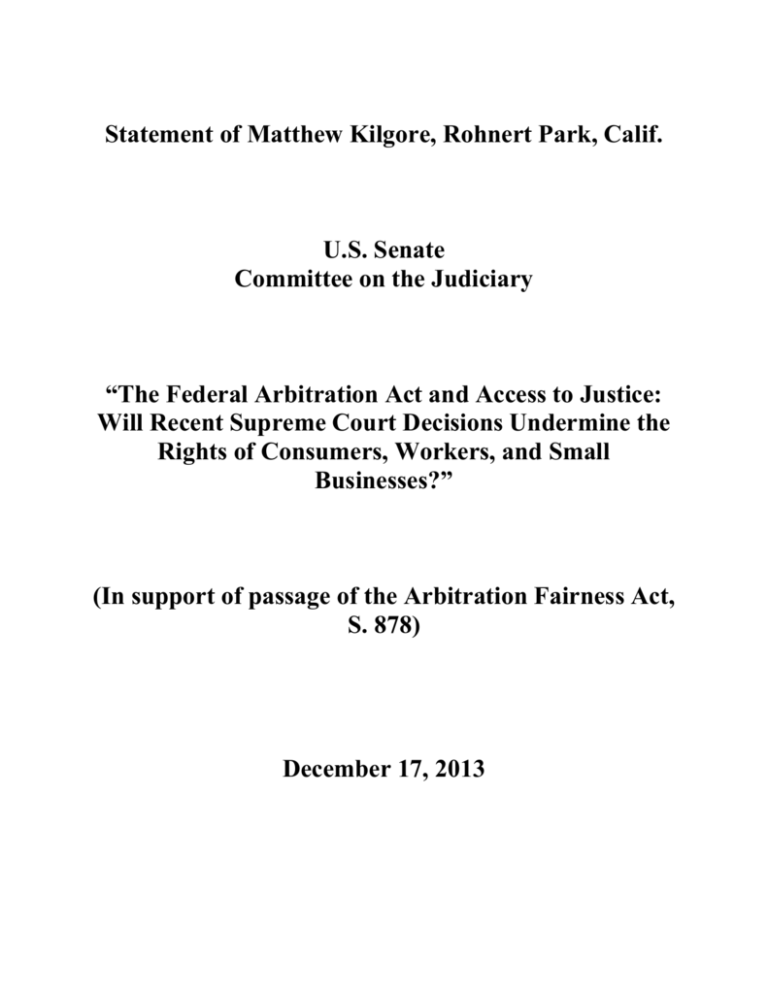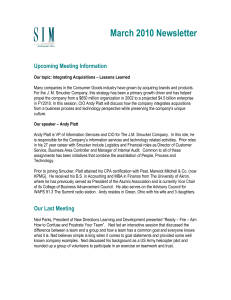The Federal Arbitration Act and Access to Justice
advertisement

Statement of Matthew Kilgore, Rohnert Park, Calif. U.S. Senate Committee on the Judiciary “The Federal Arbitration Act and Access to Justice: Will Recent Supreme Court Decisions Undermine the Rights of Consumers, Workers, and Small Businesses?” (In support of passage of the Arbitration Fairness Act, S. 878) December 17, 2013 Thank you for this opportunity to share my experiences with you for the record on forced arbitration and class-action bans. I am a private student-loan borrower who was defrauded by a for-profit college and denied access to court by the bank that made student loans to me and other students at the school. I thought I was achieving my dream of becoming a helicopter pilot when I enrolled at Silver State Helicopters in Oakland, California. But actually, like the other thousands of students of this school, I was probably the victim of a scam. I first learned of Silver State through an advertisement on the radio for an upcoming seminar in Oakland, California. I learned that the school held similar seminars all over the country, so I decided to attend. At the seminar, Silver State offered to provide pilot training and certification. My fellow students and I were told that we would earn our pilot’s license and an instrument rating in less than two years. As students, we would be able to attend classes and amass actual flight time with instructors. I knew my family would be proud of me when I accomplished this goal. The school representatives indicated at the seminar that students could obtain loans through KeyBank, National Association, apparently a primary lender for the school, to pay the tuition. Like so many others, I took out a $55,000 loan with KeyBank, to pay the trade school’s tuition. On Sunday, February 3, 2008, a short few months after I began my courses, I received a phone call from a flight instructor who told me not to attend class the next day. The school had shut down and filed for bankruptcy. Earlier this year, a bankruptcy judge who oversaw the bankruptcy proceedings for the school described it as an “airborne Ponzi scheme.” The school appeared to have been caught in a credit crunch, and collapsed when it could no longer get funded through private student loans. When the school abruptly closed, Silver State students, including myself, had no diplomas, certificates, or accreditation, nor any marketable skills, for that matter. We were certainly not qualified to be helicopter pilots. Instead we were left with tens of thousands of dollars in student-loan debt. With the help of my lawyer, I filed a lawsuit on behalf of myself and other Silver State students against Keybank. As we stated in court, Keybank knew that “the private student loan industry—and particularly aviation schools—was a slowly unfolding disaster,” yet it continued on with its business, loaning money to students and handing over the funds to the school. Additionally, my lawyers discovered that Keybank conspired with Silver State to intentionally omit the so-called “FTC Holder Rule” from both the loan documents and my contract with Silver State.1 We sought to enforce our rights under California law and the FTC Holder Rule to prevent the bank from collecting our loans or reporting non-payment of the loans to credit reporting agencies. Although the district court judge that heard the case determined that we stated a proper claim against Keybank for conspiring with Silver State to violate the Holder Rule, we were unable to pursue the case in court because of the pre-dispute forced arbitration clause and class-action waiver. Keybank’s loan terms had a provision that said borrowers would be forced to resolve legal disputes with it in private arbitration and on an individual basis. The terms also banned our participation in class actions. Keybank argued to the court that the arbitration terms and class-action ban should apply. It asked the court to deny the class action and force us students to arbitrate our claims individually. However, the district court judge denied Keybank’s motion to compel arbitration and supported our right to go to court. But then I learned about a Supreme Court decision, AT&T Mobility v. Concepcion, that was decided while our case was ongoing. This decision said that companies like Keybank could require arbitration and forbid class actions in their terms of service. As a result, Keybank appealed the district court’s decision and because of Concepcion, the appeals court said that my fellow students and I would have to settle our disputes individually in private arbitration. We could not go to court to seek redress. Another striking outcome of my experience with arbitration clauses is that Keybank borrowers like myself are at the losing end of a two-tiered justice system. A second student loan lender, Student Loan Express, Inc. (SLX) also marketed loans to Silver State students. But unlike Keybank borrowers, students who borrowed from SLX received some justice after the school shut down because SLX did not have an arbitration clause in its loan terms. Therefore, they could seek redress. I later learned that SLX student borrowers, in a class settlement, would receive up to 75 percent debt forgiveness, lowered interest rates and other redress. Although we suffered the exact same injuries and pursued the exact same paths to justice, the arbitration clause denied Keybank borrowers access to the court, while SLX borrowers received substantial relief for their harm and could move on with their lives. 1 The FTC Holder Rule, 16 C.F.R. § 433, is an important consumer protection disclosure regulation in the FTC Act which, had it been included in either Keybank’s loan documents or in my contract with Silver State, would have enabled the Silver State students to defend themselves against Keybank based on its fraudulent scheme with the school. Since 2008, my loans have accrued interest and have nearly doubled to $103,000. My wife and children continue to feel the strain of this growing financial burden. The loan debt will take funds that I would have saved for my children. Despite the enormous dollar amount to me personally, I have thus far been unable to attract a lawyer to take my case to arbitration because I cannot afford to pay one on an hourly basis and as a practical matter, nobody is willing to do it on a contingency basis because the amount is too small when my claim is considered alone. I think most companies are honest, but many of us know that there are others that will seek to take advantage of us. My fellow students and I were caught in an elaborate and deceptive corporate scheme. But I was surprised, outraged and then saddened, like most other Americans would be, that I could not go to the court to seek justice when I was wronged. Thank you for considering my story. Matthew Kilgore Rohnert Park, California








